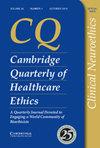评估医疗保健领域良心拒绝的公共理由方法
IF 2.3
4区 医学
Q3 HEALTH CARE SCIENCES & SERVICES
引用次数: 0
摘要
有时,尽管病人要求在专业人员的职权范围内进行合法的、有医学指征的治疗,但医护专业人员还是会出于良心拒绝治疗病人。近来,利用公共理性概念来明确哪些出于良心拒绝治疗的行为应予以照顾的观点层出不穷。本文对罗伯特-卡德(Robert Card)、马西莫-赖克林(Massimo Reichlin)、戴维-斯科特(David Scott)和道格-麦康奈尔(Doug McConnell)的四种观点进行了批判性评估。本文认为,麦康奈尔的观点与其他观点相比具有优势,因为它既要求医护人员公开说明他们出于良心拒绝治疗的理由,又要求这些理由符合最低限度的体面医疗。这种限制性相对较强的方法既能满足最低限度体面的医疗保健专业人员出于良心拒绝治疗的要求,又能保护良好的医疗保健、医疗保健专业的独立性以及信托关系。本文章由计算机程序翻译,如有差异,请以英文原文为准。
Assessing Public Reason Approaches to Conscientious Objection in Healthcare
Sometimes healthcare professionals conscientiously refuse to treat patients despite the patient requesting legal, medically indicated treatments within the professionals’ remit. Recently, there has been a proliferation of views using the concept of public reason to specify which conscientious refusals of treatment should be accommodated. Four such views are critically assessed, namely, those of Robert Card, Massimo Reichlin, David Scott, and Doug McConnell. This paper argues that McConnell’s view has advantages over the other approaches because it combines the requirement that healthcare professionals publicly justify the grounds of their conscientious refusals of treatment with the requirement that those grounds align with minimally decent healthcare. This relatively restrictive approach accommodates conscientious refusals from minimally decent healthcare professionals while still protecting good healthcare, the independence of the healthcare professions, and the fiduciary relationships.
求助全文
通过发布文献求助,成功后即可免费获取论文全文。
去求助
来源期刊
CiteScore
2.90
自引率
11.10%
发文量
127
审稿时长
>12 weeks
期刊介绍:
The Cambridge Quarterly of Healthcare Ethics is designed to address the challenges of biology, medicine and healthcare and to meet the needs of professionals serving on healthcare ethics committees in hospitals, nursing homes, hospices and rehabilitation centres. The aim of the journal is to serve as the international forum for the wide range of serious and urgent issues faced by members of healthcare ethics committees, physicians, nurses, social workers, clergy, lawyers and community representatives.

 求助内容:
求助内容: 应助结果提醒方式:
应助结果提醒方式:


